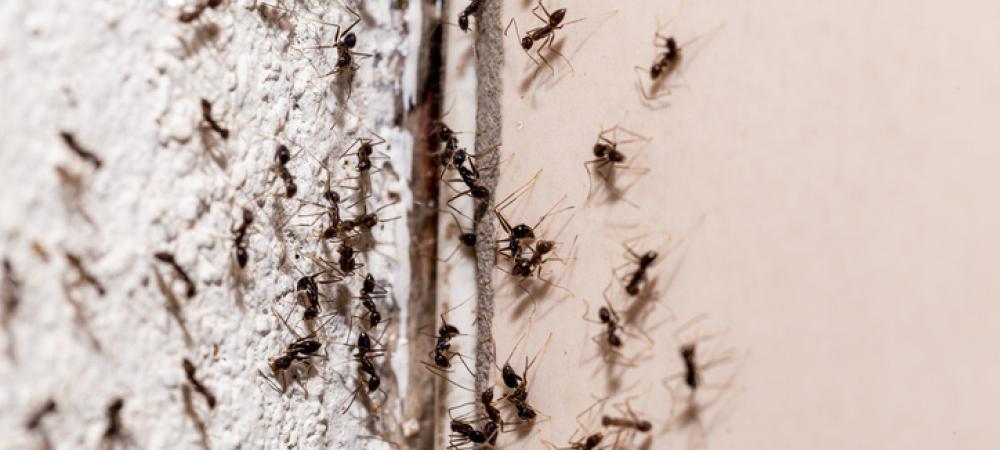Why Do I Have Ants in My Kitchen, And How Do I Get Rid of Them?

If you’re a homeowner in Texas, you’ve likely encountered ants in your kitchen at some point. Texas, with its warm climate and abundance of food sources, is the perfect environment for ants to thrive year-round. But why do they choose to come inside, and what can you do to keep them out? Here’s a helpful guide to understanding the cause of ant infestations and effective strategies to remove them.
Why Are There Ants in My Kitchen?
Ants enter kitchens for three main reasons: food, water, and shelter. Texas has a variety of ant species, from common house ants to more aggressive fire ants, and they’re always searching for sustenance, especially during the hot summers and rainy seasons.
Here are some common reasons they’re attracted to kitchens specifically:
Food Sources
Ants are highly attracted to food, especially sugary, greasy, or protein-rich substances. If there are crumbs on the floor, food spills on countertops, or open food containers, ants will find their way to them. Common foods that attract ants include:
- Sugary snacks, candy, and juices
- Bread, crackers, and other baked goods
- Fruits and vegetables, especially when overripe
- Grease and oils from cooking or food preparation
Water
Texas summers can be extremely hot, and ants need water to survive—kitchens offer easy access to moisture. Leaky faucets, standing water in sinks, and damp areas under appliances are prime spots for ants to gather. They may also be attracted to pet water bowls or leftover dishes with food residue. In dry conditions, the moisture from these sources is highly attractive.
Warmth and Shelter
Kitchens are often warm, which is appealing to ants looking for a comfortable place to live. They can find shelter in cracks, crevices, and hidden spaces like under the fridge, behind cabinets, or inside walls. These areas provide ants with a safe place to nest and access to food and water.
Scent Trails
Ants use scent trails to communicate with one another. Once they find a food or water source, they leave a pheromone trail for others to follow. This is why it’s not uncommon for an ant infestation to grow quickly — where there’s one ant, there are usually many more following behind!
Entry Points
Ants are experts at sneaking into your home. They can enter through tiny cracks in doors, windows, or even along the foundation. Once they find an entry point, they begin their search for food and water, and it doesn’t take long before they spread out through your kitchen. The mild Texas winters allow ants to stay active all year, meaning they can enter homes anytime they’re in need.
Outdoor Ant Colonies Nearby
Many Texas homeowners have landscaped yards, which can unknowingly host ant colonies. When outdoor food sources are scarce, ants from these colonies may migrate indoors, especially into kitchens where they can find ample food and water.
By understanding what attracts ants to your kitchen, you can take steps to eliminate their food sources, seal entry points, and remove any standing water, helping to prevent an infestation.

How to Get Rid of Ants in Your Kitchen
Ants in the kitchen are a common nuisance. They invade looking for food, water, and shelter, and once they find something they like, they’ll keep coming back. Here’s a quick guide on how to get rid of ants in your kitchen and keep them out for good.
1. Clean Up Food and Spills
The first step is to make your kitchen less appealing to ants by eliminating any accessible food sources. Ants are attracted to sugary and greasy substances, so wipe down countertops, sweep floors, and clean up spills and crumbs immediately. Don’t forget to clean under appliances like stoves and refrigerators where food particles can accumulate.
2. Store Food Properly
Ants can easily find their way into open food containers, especially those holding sugary items or snacks. Store all food, including pet food, in airtight containers. Avoid leaving open packages on countertops, and regularly check your pantry for any open or leaking packages.
3. Seal Entry Points
Ants can enter your kitchen through even the tiniest cracks and gaps around windows, doors, and baseboards. Inspect your kitchen for potential entry points and seal them with caulk or weather stripping. Pay special attention to areas near windowsills, under sinks, and around pipes.
4. Set Up Ant Baits and Traps
Ant baits are a highly effective way to deal with an infestation, as they allow ants to carry poisoned bait back to the colony. Place bait stations near areas where ants are active but avoid placing them in spots where food is prepared or eaten.
5. Keep Sinks and Drains Clean
Ants are often attracted to moisture, so keep your kitchen as dry as possible. Fix any leaky pipes or faucets, and avoid leaving standing water in the sink. Pouring boiling water down your sink drains can also help flush out any ants hiding there.
6. Maintain a Clean Trash Area
Trash cans are prime targets for ants. Make sure your trash can has a tight-fitting lid and is emptied regularly. Wipe down the can itself to remove any residue that may attract ants, and avoid leaving food waste or sticky residues on the surrounding floor.
When to Call a Professional
If you’ve tried these steps and are still seeing ants, it may be time to contact a pest control professional. Some ant species, such as pharaoh ants and carpenter ants, are especially tough to get rid of without specialized treatments. Professionals have the knowledge and tools to tackle persistent infestations and identify the specific ant species, ensuring the right solution. Learn more about our professional pest control treatments at Justice Pest Services that keep ants and other pests out of your home for good.
How to Find Out Where Ants Are Coming From
Tracking down the source of ants can help you target your efforts to eliminate them. Start by following the ant trail; ants usually travel in a line between their food source and entry point. Look around windows, doors, cracks in walls, and under sinks, as these are common entry points. Pay attention to areas where food and water are accessible, such as counters, pantries, and near trash cans. Once you find the entry point, you can seal it to prevent more ants from entering and place targeted repellents or bait nearby to address the colony effectively.
How To Get Rid of Ants Naturally
Natural repellents are a great way to tackle ants in your kitchen without relying on chemical solutions. Here are some more options that can be effective get rid of ants without using chemicals:
- Borax and Sugar Bait: Borax is highly effective at eliminating ant colonies. Mix one part borax with three parts sugar and add a little water to form a paste. Place small amounts near ant trails (out of reach of children and pets). The sugar attracts ants, while the borax poisons them, allowing them to carry it back to the colony.
- Baking Soda and Powdered Sugar: Similar to borax, baking soda can be used to bait and kill ants. Mix equal parts baking soda and powdered sugar, and place small amounts near trails. The sugar draws ants in, and when they ingest the baking soda, it disrupts their digestive system.
Natural repellents can be a powerful addition to your kitchen ant prevention strategy. You may need to try a few methods to find the one that works best for your specific situation, but in the end, chemical treatments are still the most effective.
What Smells Do Ants Hate?
Ants have a strong sense of smell and tend to avoid certain scents. Here are some smells that ants hate:
- Vinegar: The strong smell of vinegar disrupts ants’ scent trails and repels them from the area.
- Lemon: Ants dislike the acidic scent of lemon. Lemon juice or lemon peels can act as a natural repellent.
- Peppermint: Ants find peppermint oil overwhelming and will avoid areas treated with this scent. It’s a great natural deterrent.
- Cinnamon: Ground cinnamon has a strong, spicy scent that ants dislike, and it can prevent them from crossing certain areas.
- Eucalyptus: The fresh, strong smell of eucalyptus oil can repel ants and other pests.
- Tea Tree Oil: This oil has a potent scent that ants find unpleasant and helps keep them away.
- Lavender: Ants generally avoid the scent of lavender, making it useful as both a repellent and a pleasant-smelling deterrent.
- Clove: The strong, spicy scent of cloves can act as a barrier for ants.
By using essential oils like peppermint, tea tree, or eucalyptus, you can effectively create a natural barrier that ants prefer to avoid.
